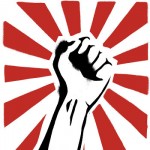[From José and Jon:]
Overall, we though that our conclusion class went well. During our planning, we knew that there were a lot of different topics and themes that we wanted to discuss, and that it was going to be hard to cover all of them in one class.
We tried to point to as many topics as possible, especially ones that had run throughout the class, but we also wanted to point to themes that we had mainly only touched on briefly, and which deserved greater expansion and development.
It was good to ask the class to supply further themes that we’d covered, but weren’t in our list, to add to our collective intelligence and knowledge about what we’ve achieved over the semester.
We had started the semester with the question of “what is a revolution,” and wanted to return to it now that we had covered a range of texts that addressed more specific, sometimes more personal matters, in the context of concrete revolutionary processes. So this was a chance to return to more abstract and theoretical questions about revolution.
Even though we included a large range of revolutionary topics in our lesson plan, we were still able to discuss almost all the topics that we set out, and also to focus on issues of revolutionary texts, leadership and narrators, and especially in conclusion on whether or not we still wanted a revolution.
Although we were trying to wrap up the class, collectively we were still thinking of new ways to interpret what we had learned throughout the semester.
Finally, we asked whether or not everyone still wanted a revolution. Although some people’s opinions hadn’t changed–perhaps, nobody’s–the discussion and reasoning that people had to back up their opinion were newly informed by the topics that had been discussed over the past twelve weeks.

